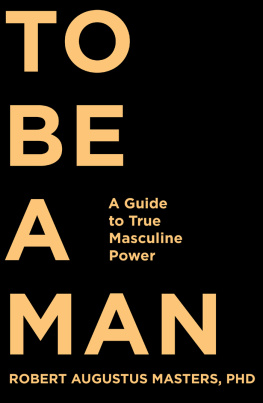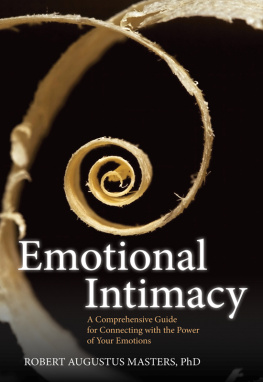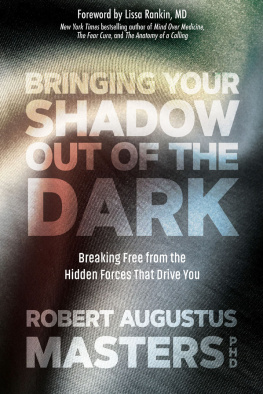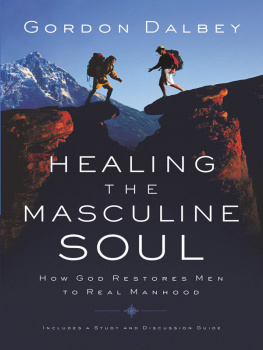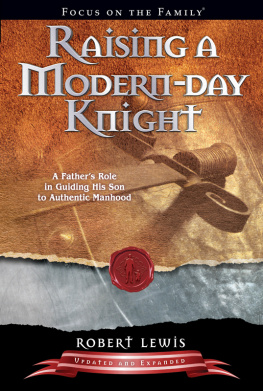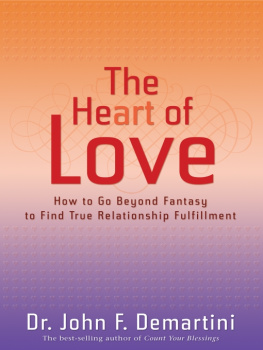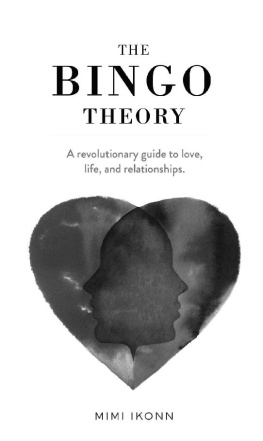
For Diane
Through being with you, beloved, I have found my deepest healing and growth, and the fullest embodiment of my manhood. Every day Im grateful I get to be with you. Bound together are we yet free, twin flames of intimacy.
Contents
Introduction
True Masculine Power
BE A MAN!
This demand does a lot more harm than good. Its a powerful shame amplifier, packed with shouldsand the last thing males need is more shaming, more degradation for not making the grade.
Menand boyswho are on the receiving end of be a man! get the message that they are lacking in certain factors that supposedly constitute manliness.
And what are some of these factors? Showing no weakness; emotional stoicism; aggressiveness; holding it together and not losing face, no matter whats going on; sucking it up. (Think of what pride boys may feel when theyre successful at this, especially when theyre strong enough to not cry or show any signs of vulnerability.)
A manly handshake is a firm one, even a steely one; a manly approach means, among other things, keeping it together emotionally, not losing ones cool. To be unmanned is to lose it emotionally (except when it comes to anger), such a loss of face often being taken to mean a loss of strength. (When Abraham Lincoln couldnt help crying publicly over the killing of a friend, he described his very visible upset as having unmanned him.) To be unmanned means being visibly vulnerable, being ball-less (chickening out), being brought low by shame, being subservient to dominant others.
To man up is an expression originally used in football and military contexts, and means not much more than toughen up, move into battle, grow a pair, with the apparent failure to do so often resulting in a male getting referred to as a girl or lady (who in this context epitomize softness, equated in many a male mind with weakness). Imagine a masculine icon, a famous leader or athlete, not just misting up, not just shedding a few silent tears or fighting back his tears, but crying hard and with abandon. This would be very, very uncomfortable for all too many men to watch, no matter how understandable the sadness or grief was.
Men may respond to the exhortation be a man! by getting harder or tougher, more ruthlessly driven, more competitive, more uncaring about their unresolved wounds, making getting over it more important than feeling it or going through it. Conversely, men might also respond to the exhortation be a man! by rebelling against its certainties of what constitutes a man, driving their hardness and competitiveness into the shadows, and making too much of a virtue out of their softness and more feminine qualities. But in either case, they are reacting to whatever notion of manhood has been or is being authoritatively held aloft before them, defining themselves throughand impaling themselves uponsuch reactivity.
So lets consider other factors or qualities that ought tobut generally dontcount for much in making a male a real man, factors that many men keep in the shadows: vulnerability, empathy, emotional transparency and literacy, the capacity for relational intimacyall qualities more commonly associated with being female than male.
The visible presence of these soft qualities induces far more discomfort in most men than the hard ones do. But once they are brought out into the open, respected, and honoredwhich takes couragethey can coexist with the capacity to express anger skillfully and take strongly directed action, empowering men in ways that serve everyones highest good. True masculine power is rooted in this dynamic blend of soft and hard attributesshowing up as a potent alignment of head, heart, and guts. When head (thinking, rationality, analysis), heart (caring, compassion, love), and guts (resolve, resilience, bravery) all inform each other and work together, a truly healthy manhood cannot help but arise.
Getting to such power requires facing and outgrowing less-than-healthy forms of power. There is great beauty and much to celebrate when men step more fully into their authentic manhood, a beauty at once rough and tender, caring and fierce, raw and subtle, anchored in standing ones true ground, whatever the weather.
SOFTENING DOES NOT NECESSARILY MEAN EMASCULATION
Many boys are subjected to the demand be a man!or man upfrom an early age. Such pressure, however well-meaning, can shame and harden a boy well before he reaches adolescence, shrinking him emotionally, making him shun softness and overvalue performance and the appearance of having it together. Showing vulnerability may invite gibes about being less than masculine. Many a boy has had to force himself to learn not to cry or show tenderness in order to become one of the boys rather than a reject or someone to shun.
Softness is rarely associated with manliness, except perhaps in superficial, tightly controlled ways. What it is commonly associated with is weakness and being feminine, and not just in conventionally masculine contexts: the kick-ass, militaristic warrior heroines of contemporary cinema usually are just as hard and removed from softness (read: weakness) as their male counterparts.
Telling a man that hes soft is usually far from a compliment. Softnessor perceived softnessis ordinarily taken to be a failing for men (and boys and youths), a sign of being gutless or spineless, a damning proof of emasculation. No wonder so many men take pains not to appear soft, except perhaps for noiselessly shedding a few tears at certain events, such as funerals or the retirement press conference of an admired athlete. Softness in a man is also very commonly equated with sexual failure, an inability to get it up or keep it upa hard-not-to-notice failure to stay hard. More than a few men refer to their genitals as their manhood; not being able to sustain an erectionthat is, being softeasily gets associated with a loss of manhood.
Men nonetheless need to soften, and also to strip softening of its negative connotations. Yes, a man can be overly soft, marooned from power and the capacity for rock-solid firmness, but softness itself makes possible vulnerability, empathy, compassion, emotional literacy, and genuinely deep connections with others. Softness does not necessarily mean an absence of courage! To be unapologetically vulnerable is not to be unmanned, but to be deepened in your manhood.
Softening can be a profoundly healing undertaking, helping to make more room for pain and difficulty, enriching a mans capacity for deep relationship, rendering him more flexible and permeable, more heartfulespecially when that softening coexists with stead-fastness and firmness. An example of such coexistence can be seen in fierce compassion, wherein were both forceful and soft, both angered and caring.
SHAME LEFT UNATTENDED IS SHAME THAT RUNS US
Be a man! may seem a straightforward statement, but it is packed to varying degrees with pressures and expectationsand often an in-your-face shamingthe delivery of which can alienate men from much of their basic humanity. Such alienation has enormous consequences. When we are thus cut offemotionally and relationally disconnected or numbedwe are far more capable of dehumanizing activity, far more able to rationalize harmful behavior, far more likely to be caught up in abuses of power and sex. But nothing can truly compensate for whats been lost through such disconnection and numbing. Dissociation from ones soulones individuated essence or core of beingis hell, regardless of ones comforts and distractions, and all too many men are suffering this, doing little more than just getting by or dutifully manning up.
Next page
